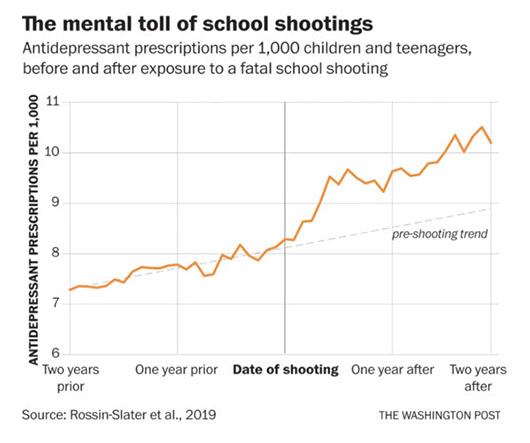The week raising the smoking age, extending family leave, and funding research on gun violence was obscured by history
In this historic news week of Impeachment and revising the North American Free Trade Agreement, healthcare news that might have been on front pages gained only passing remark. There were some pretty big decisions as well as research of note.
2.1 million federal workers will receive paid family leave
The U.S. is one of only two nations in the world that does not offer some form of paid leave, leaving over 80 percent of workers with little financial recourse if they must take time off to care for a new child or a sick family member. The Family and Medical Leave Act (FMLA) currently provides workers with up to 12 weeks of unpaid leave—and only 60 percent of Americans can access even that, due to limitations on the number of employees a business has. All told, only about 19 percent of workers in the U.S. have access to paid family leave.
This week’s defense spending authorization extended paid parental leave to the federal government’s 2.1 million employees. This will give 12 weeks of paid family leave to parents of newborns, newly adopted children or foster children. This establishes 12 weeks of paid leave as a norm that other organizations may emulate. [PBS]
Congress raised the national age to buy tobacco to 21
The House and Senate voted to permanently ban the sale of tobacco products to anyone under the age of 21 as part a far-reaching spending bill expected to be signed by the President. Nineteen states and more than 500 cities and towns have already raised the age to 21. Setting it as a national age limit is viewed as an effort to appease those who are calling for a full ban on e-cigarettes or a flavor ban to prevent addicting a new generation to nicotine. [The Hill]
One in five high school seniors vaped marijuana in the last year
Also, the portion of high school seniors who said they’d vaped marijuana in the past month nearly doubled over the past year — jumping from 7.5% in 2018 to 14% in 2019. It was the second-largest annual jump seen for any substance since the survey began in 1975. [Stat News]
Congress will fund a modest gun violence research rather than block it
This week’s federal spending bill included the first direct research funding, a modest $25 million to be administered by the CDC and NIH. While modest, these two organizations are likely to support studies treating gun violence as a public health issue, rather than being done through a lens of criminality. Nearly two-thirds of gun deaths are suicides, which obviously has dynamics that differ from violent crime.
The impact of school shootings on mental health is becoming clear
Stanford’s Institute for Economic Policy Research found the use of antidepressants among children who have survived gun violence increased more than 21 percent in the two years following a fatal incident. Three years after, use increased to 24.5 percent. [Washington Post]


 The future of digital experiences will be built by strategists who grasp the full array of emerging business, social, and technical models. Specialties in user experience, branding, application design, and data science are laying the foundation for richer user experiences and business models breakthrough products and revenue based marketing.
The future of digital experiences will be built by strategists who grasp the full array of emerging business, social, and technical models. Specialties in user experience, branding, application design, and data science are laying the foundation for richer user experiences and business models breakthrough products and revenue based marketing.
3 Responses to "The week raising the smoking age, extending family leave, and funding research on gun violence was obscured by history"
June 14, 2020
Great research done! This will benefit the nation. Looking forward for updates…
September 21, 2022
speak for you.
comprare patente di Guida
July 31, 2023
This can seem like a really tall order, but if you two are meant to be (or meant to be friends), waiting a few months to a year may be worth it.